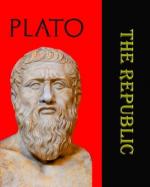|
|
The Republic Author/Context
Plato was born in 427 B.C. He came from a family that played a prominent part in Athenian politics. However, he did not join politics, as he was disgusted by its violence and corruption, and sickened by the execution of Socrates (his friend and teacher) in 399 B.C. Inspired by Socrates, Plato dug deep into the nature of ethics, knowledge and virtue, coming to the conclusion that no kingdom would be happy unless philosophers became kings, or kings became philosophers.
Plato founded the Academy in Athens in the late fourth century. It was the first permanent institute devoted to philosophical research and teaching, and it was used as a prototype for all western universities. He was well traveled and was the political advisor to the ruler of Sicily. He died in 347 B.C.
Plato was a student of Socrates and went on to teach many famous people, such as Aristotle, who wrote treatises on everything from poetry to biology, and who was himself the tutor of Alexander the Great. Plato was also an advisor for the king of Syracuse, but this ended in drastic failure and he was eventually exiled from Sicily. His "influence throughout the history of philosophy has been monumental" (Ron Turner) and he is often considered the father of Western philosophy. However, his works also contain mathematics, history and moral and religious aspects. He wrote over twenty philosophical dialogues and thirteen letters. The Republic, although a conversation, was divided into dialogues, book by book. The reason for writing philosophy in conversational format is that it allowed Plato to depict Socrates in action. Furthermore, Socratic philosophy can only be realized through question and answer, and thus the dialogue format of Plato's works allows for this philosophical realization and understanding.
In this book, written after Socrates' death, Plato attempts to make the reader feel that Socrates was a true philosopher and not a sophist, as some people claimed. Furthermore, he tries to show the people Socrates' method of teaching, and that he did not take money for his teachings, nor coerce people into believing him. Also, Plato tries to bring across Socrates' claim that the only way in which his wisdom exceeds that of others is that he recognizes the state of his ignorance. Lastly, he is trying to show people that Socrates was trying to live a just life, and that he did not make any assumptions, but instead tried to find out the truth of what a just life is and to live by that truth.
Bibliography
Hugh Tredennick and Harold Tarrant. Plato, The Last Days of Socrates. Penguin Classics: 1993.
Raymond Larson. The Republic. Crofts Classics: 1979.




